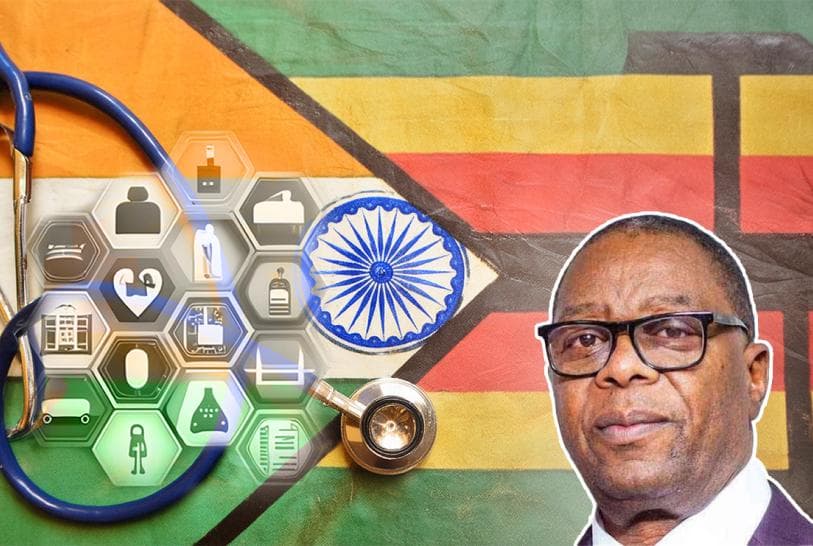Healthcare Beyond Borders
Zimbabwe aims to enhance healthcare for its citizens by boosting medical tourism in India.

The recent re-election of India’s Prime Minister Narendra Modi for a third consecutive term is set to further strengthen the relations of India and Zimbabwe, particularly in the health sector.
Last year, when India was celebrating its independence, Zimbabwe President Emmerson Mnangagwa aptly summed up the warm relations between the two countries - “I look forward to strengthening the bond between our two great nations with PM Narendra Modi over the coming years. India, the people of Zimbabwe stand with you!” he said. In response to this message, PM Modi said: “Gratitude to President Emmerson Dambudzo Mnangagwa for the wishes. I agree with him on the need to further strengthen ties between India and Zimbabwe for the benefit of our citizens. For years dating back to the era when Zimbabwe was yet to attain its independence in 1980, India played a very crucial role in supporting majority rule.”
These two messages show that the two nations have a strong bond dating back to over six decades and the re-election of PM Modi is a welcome development as India and Zimbabwe will continue with their goals of bringing economic development and better health for citizens.
In later years, it is also worth noting that India has played an important role in providing training for doctors and nurses from Zimbabwe in India. India has also helped Zimbabwe in seconding its doctors and other medical specialists to Zimbabwe. Because of its advanced medical technology, and affordable and high quality medical treatment, the Zimbabwe Government has welcomed how its citizens, especially cancer patients have been travelling to India to seek treatment.
As the Zimbabwe Government, we have also noticed that medical tourism in India can be a viable solution for Zimbabweans healthcare needs. We are also gratified that the Indian Government has taken positive steps in promoting, facilitating and simplifying the processing of visa procedures for patients for medical treatment in India.
Discussions continue to be on-going on the issue. However, I can add there are some specialist training opportunities in India for Zimbabwean nurses and doctors in oncology, palliative care and pain management, radiation oncology and psychiatry training to manage and rehabilitate drug and substance abuse victims.
Since 2020, India and Zimbabwe, have had a facility that will enable Zimbabwe to buy essential drugs and medicines directly from India saving the country millions of dollars by doing away with middlemen. Also India has managed to deliver some ambulances to the Zimbabwe Government to boost its fleet.
By being able to buy medicines directly from India, we will avoid third parties that inflate drug prices and make the drugs unaffordable to the ordinary people. Buying directly will also save the country millions of dollars.
Besides health care, the third session of India-Zimbabwe Joint Trade Committee held in New Delhi in May 2024, covered a variety of issues, including cooperation in digital transformation solutions, fast payment systems and geospatial to boost bilateral trade between the two countries.
On health, the meeting focussed mainly on telemedicine, pharmaceuticals and how to improve health care relations between the two countries. It was noted that India has an industrialised pharmaceutical industry with world-class standards, while Zimbabwe has natural resources and joint ventures between the two nations would result in the production of affordable and easily accessible drugs. Like what I have alluded to earlier, there are a number of Zimbabwean doctors and nurses receiving specialist training in India.
I would also like to add that with the advancement in medical training in India, a high number of Zimbabwean students are also in India receiving training in various medical fields using their own private sourced funds. The Indian Government through the Indian Embassy in Harare also offers annual scholarships to Zimbabwean students to study in various fields, including medicine, pharmacy and nursing and we are grateful to that although we would be glad if the intake numbers are increased so that more students are enrolled and these would improve on service delivery in Zimbabwe once they complete their training and return home.
The platform helped India in managing its Covid vaccination programme. However, as Zimbabwe we are faced with a number of communicable diseases such as cholera, influenza, typhoid. As a result we are very welcome to the idea of working with India in finding lasting solutions to these outbreaks through the use of health tech.
I am also glad that talks are at various stages between the two countries on how to assist Zimbabwe manage communicable diseases through tech tracing. Telemedicine is becoming more popular in Zimbabwe like in other countries throughout Africa. It is expected to grow as artificial intelligence (AI) becomes more widely used.
We are glad that it is one of the issues that were discussed during the India-Zimbabwe Joint Trade Committee (I-ZJTC) in May this year.
Our President Emmerson Mnangagwa’s mantra since attaining office in 2018, is that “Zimbabwe is open for business,” and as a Ministry, we fully appreciate and welcome private players, India included, to come and invest in Zimbabwe, including in the health sector.
The partnership between India and Zimbabwe continues to grow and I am happy that India continues assisting Zimbabwe in terms of the country’s health growth.
As Zimbabwe, we appreciate that Indian government is always ever ready to strengthen economic ties and support our local health sector, including assisting in cancer control in Zimbabwe, which unfortunately remains one of the main killers in the country.

Hon. Minister Dr. Douglas Mombeshora 🇿🇼
Deep Dive
TeleMedicine: Over the last three years, ISRO’s telemedicine network has grown to link 45 rural and remote hospitals with 15 superspecialty hospitals.
Health Tech 2023: The Indian health-tech sector is projected to reach $50 billion within the next decade, creating 100,000 jobs through the Ayushman Bharat, National Health Protection Scheme.
Medical Tourism: Approximately 2 million patients visit India each year from 78 countries for medical, wellness and IVF treatments, generating $6 billion for the industry which is expected to reach $13 billion by 2026.


































